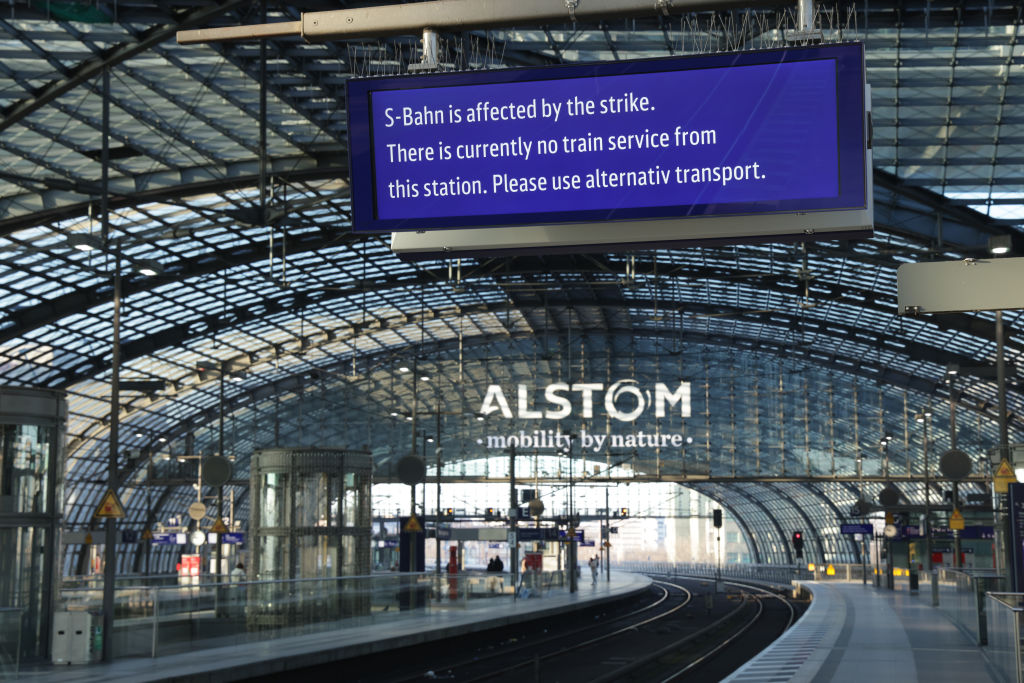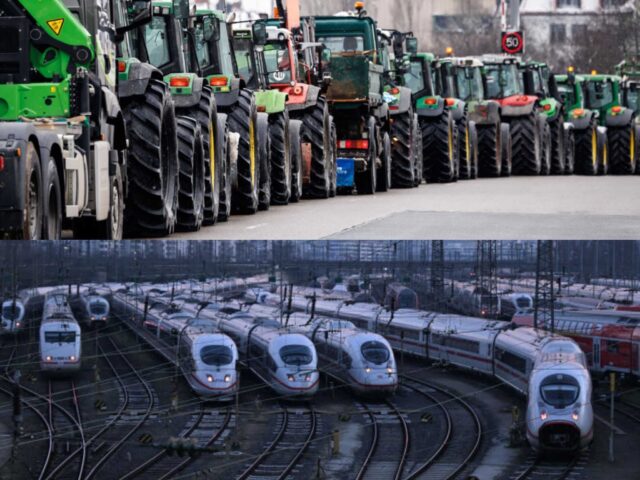BERLIN (AP) – A union representing many of Germany´s train drivers started a nearly three-day strike early Wednesday in a rancorous dispute with the country´s state-owned main railway operator over working hours and pay.
Train travel across the country and in many cities came to a near standstill with commuters and other travelers struggling to find alternatives involving long-distance bus or car travel or flights.
State-owned Deutsche Bahn said only around 20% of its long-distance trains were running and commuter trains in cities like Berlin were also not in operation.
The GDL union’s strike on cargo trains began on Tuesday evening.

BERLIN, GERMANY – JANUARY 10: A sign at Hauptbahnhof main railway station informs passengers that S-Bahn commuter trains, which are run by Deutsche Bahn, are not running on the first day of a 64-hour nationwide railway strike on January 10, 2024 in Berlin, Germany. The GDL labour union of locomotive drivers and carriage staff has launched the strike against Germany’s state railway carrier Deutsche Bahn following recent negotiations over pay and working hours that the GDL claims has only produced inadequate proposals from Deutsche Bahn. The strike is due to end at 6pm on Friday. (Photo by Sean Gallup/Getty Images)
In the wage dispute, the GDL union had already called two previous warning strikes last year, which lasted a maximum of 24 hours in passenger transport. The current strike lasts until Friday at 6 p.m.
Deutsche Bahn had tried to legally prevent the strike until the very end, but on Tuesday night a court ordered that the strike could go ahead.
Late last month, members of GDL voted overwhelmingly to stage open-ended strikes in a bitter dispute.
In addition to pay raises, the central issue is the union´s call for shift workers´ hours to be reduced from 38 to 35 hours per week without a pay reduction, a demand for which employers so far have balked.
Establishment Panic: German Vice Chancellor Blames Putin for Farmer Protests, Media Brands Protests as ‘Far-Right’https://t.co/e6cTYBCzRO
— Breitbart London (@BreitbartLondon) January 9, 2024
GDL argues that it would make working for the railway more attractive and help attract new recruits, while Deutsche Bahn says the demand can´t practically be met.
Germany’s Transportation Minister Volker Wissing called on both sides to return to the negotiating table.
“A way has to be found that both sides can get along with,” the minister told daily newspaper Bild. “That means talking to each other. I urge both sides to return to the negotiating table.”
However, union head Claus Weselsky said it was now up to Deutsche Bahn to present an improved offer.
If there’s no new offer until Friday, “we´ll take a break and go into the next strike,” Weselsky said in an interview on public broadcaster ZDF’s morning show after the start of the train drivers´ strike.
The train drivers’ strike coincides with an unrelated one-week strike by farmers who have been blocking city streets and highway access roads in parts of the country since Monday. They have snarled traffic with their tractors to protest against a government plan to scrap tax breaks on diesel used in agriculture and led to further traffic problems in Germany.
Farmers Revolt! Tractor Protests Bring Germany to Standstill over Government’s Globalist Agendahttps://t.co/jZRMZsoMYN
— Breitbart London (@BreitbartLondon) January 8, 2024

COMMENTS
Please let us know if you're having issues with commenting.